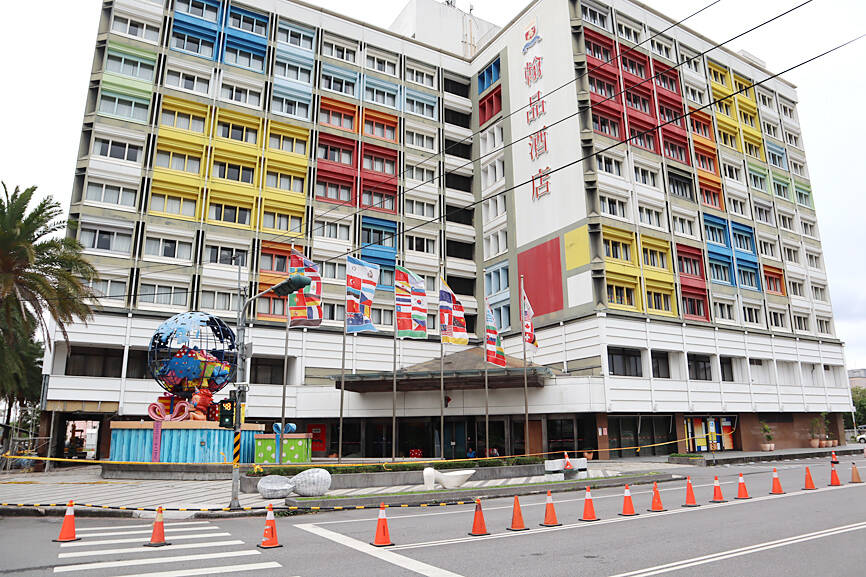The owner of Chateau de Chine Hualien (花蓮翰品酒店) is planning to lay off 86 workers after shutting down the hotel due to damage it sustained in a powerful earthquake on Wednesday last week, the Ministry of Labor said yesterday.
The hotel has submitted a layoff report to the Hualien County Government and expects to let 69 workers go this month and 17 next month, the ministry said.
LDC Hotels & Resorts Group (雲朗觀光集團), the owner of Chateau de Chine Hualien, confirmed the layoff plan in a statement yesterday.

Photo: CNA
LDC said the hotel has been closed since Wednesday last week when the temblor occurred on the coast of Hualien.
The earthquake, the strongest to hit Taiwan in nearly 25 years, measured 7.2 on the Richter scale and magnitude 7.4 on the moment magnitude scale.
The group has followed the Act for Worker Protection of Mass Redundancy (大量解僱勞工保護法) by submitting the layoff plan to local labor authorities, LDC said.
LDC had been planning to rebuild the Chateau de Chine Hualien, which is more than 40 years old, and because of serious damage caused by the earthquake, it immediately shut the hotel down to start the project, local media reported.
The building was reportedly left with cracked, flaking and chipped concrete surfaces after the earthquake and its immediate aftershocks.
LDC said it would talk with the hotel’s affected employees to see if they are willing to transfer to the group’s other businesses, pledging that those who want to leave would have their interests protected under the Labor Standards Act (勞動基準法).
Chateau de Chine Hualien has almost 100 employees, LDC said.
The group operates other hotels in Taiwan, including Palais de Chine Hotel Taipei (君品酒店) and Fleur de Chine Hotel (雲品溫泉酒店) near Sun Moon Lake (日月潭), as well as others under the Chateau de Chine, Maison de Chine (兆品酒店) and Hotel Pin (品文旅) brands. It also runs the banquet facility Gala de Chine (頤品大飯店).

Application-specific integrated circuit designer Faraday Technology Corp (智原) yesterday said that although revenue this quarter would decline 30 percent from last quarter, it retained its full-year forecast of revenue growth of 100 percent. The company attributed the quarterly drop to a slowdown in customers’ production of chips using Faraday’s advanced packaging technology. The company is still confident about its revenue growth this year, given its strong “design-win” — or the projects it won to help customers design their chips, Faraday president Steve Wang (王國雍) told an online earnings conference. “The design-win this year is better than we expected. We believe we will win

Intel Corp chief executive officer Lip-Bu Tan (陳立武) is expected to meet with Taiwanese suppliers next month in conjunction with the opening of the Computex Taipei trade show, supply chain sources said on Monday. The visit, the first for Tan to Taiwan since assuming his new post last month, would be aimed at enhancing Intel’s ties with suppliers in Taiwan as he attempts to help turn around the struggling US chipmaker, the sources said. Tan is to hold a banquet to celebrate Intel’s 40-year presence in Taiwan before Computex opens on May 20 and invite dozens of Taiwanese suppliers to exchange views

Chizuko Kimura has become the first female sushi chef in the world to win a Michelin star, fulfilling a promise she made to her dying husband to continue his legacy. The 54-year-old Japanese chef regained the Michelin star her late husband, Shunei Kimura, won three years ago for their Sushi Shunei restaurant in Paris. For Shunei Kimura, the star was a dream come true. However, the joy was short-lived. He died from cancer just three months later in June 2022. He was 65. The following year, the restaurant in the heart of Montmartre lost its star rating. Chizuko Kimura insisted that the new star is still down

While China’s leaders use their economic and political might to fight US President Donald Trump’s trade war “to the end,” its army of social media soldiers are embarking on a more humorous campaign online. Trump’s tariff blitz has seen Washington and Beijing impose eye-watering duties on imports from the other, fanning a standoff between the economic superpowers that has sparked global recession fears and sent markets into a tailspin. Trump says his policy is a response to years of being “ripped off” by other countries and aims to bring manufacturing to the US, forcing companies to employ US workers. However, China’s online warriors